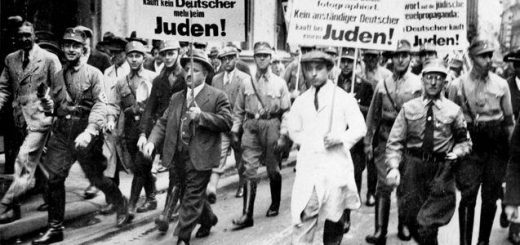Iraq, Chateaubriand, and the Festival of Our Freedom

The month of Nisan is upon us, and our preparation for the Festival of Freedom is entering its final, frenetic state. The war in Iraq, foundering on the shoals of the primitiveness of Arab society, should offer us new ways of appreciating what Hakadosh Baruch Hu did for us.
Remember the pride we felt when we learned that one of the strongest influences on President Bush’s thinking about resisting Islamofascism was Natan Sharansky? How the diminutive hero of the refuseniks so impressed the President that he had members of his cabinet read Sharansky’s book? How enthralled America was with the notion that the ultimate weapon against tyranny and repression was democracy itself? If the Iraqis could just stick with it long enough to taste the power of the ballot box, there would be no turning back. They would surely stay the course after that.
The election came and went, and the course instead wended its way into a smoldering civil war. What went wrong?
Remember the disgust so many Americans felt when Iraqis spat at the notion of democracy? Who would not want to be free? What kind of people would laugh at the mention of democracy, and regard it as a tainted failing of heretics and pagans?
Rousseau said, “Liberty is a strong food, but it needs a stout digestion.” The Iraqis did not have the stomach for freedom. Sharansky may have been correct, but many underestimated how thoroughly a society’s soil must be tilled before the precious shoot of freedom can take firm root.
We can hardly be surprised. Freedom has a spotted record. It has been spurned before – even by those who tasted of its blessings – by whole societies that gladly traded their present liberty for a promise of future security. Think of France after the Terror, or Germany’s election of Hitler y”s in rejection of Weimar instability, or the masses of Russians who continue to clamor for the more sedate and lawful days of Communist rule.
Freedom has also been misunderstood. To a France that had imagined itself free by drawing the blood of monarchs, Chateaubriand offered a paean to the casting off of old fetters:
Primitive liberty, I recover you at last! I pass like this bird that flies before me, which guides itself by free chance, and knows no embarrassment except in the choice of shade. Here I am as the Almighty made me, sovereign of nature, carried triumphantly over the water, while the denizens of the streams accompany me in my course. and the inhabitants of the air sing their hymns to me, the beasts of the earth salute me, the forests bend their tree-tops as I pass. Is it on the forehead of the man of society, or on mine, that the immortal seal of our origin is engraved? Run, then, to shut yourself up in your cities; go subject yourself to your petty laws; gain your bread by the sweat of your brow, or devour the bread of the poor; kill one another for a word, for a master; doubt the existence of G-d, or worship him under superstitious forms; as for me, I shall go wandering in my solitudes; not one beat of my heart will be checked, not one of my thoughts shall be suppressed; I shall be as free as nature; I shall recognize no sovereign except him who lit the flame of the suns, and who, with one stroke of his hand, set in revolution all the worlds.
Here is an imagined freedom straining under its own excess. Man could be free of all law, all restriction. In doing so, he would find his place in Nature itself, living in harmony with all Creation, and with its Creator. (No matter that Chateaubriand had ceased believing in Him!)
It took the nineteenth century to demonstrate that Man could not rid himself of law, that purging a country of monarchs would lead to cycles of anarchy and repression. It took the twentieth to teach that Man could not escape the demands of Nature (one not as hospitable as previously thought) and nurture, and thus could never be completely free. Today, we are still learning that very few people shake loose the personal demons that haunt every individual’s inner sanctum, restricting and restraining him.
Eventually, some people will get to where Chazal left us thousands of years ago. Freedom does not mean license, but the ability to be what we are at our core, to actualize our true selves. “There is no free person save he who involves himself with Torah.” Limitation can make us limitless, if it removes the irrelevant, external obstructions that block us from being what we were designed to be. Torah sets us free to discover the Image of G-d within.
Over six hundred years ago, the author of Sefer Hachinuch (Mitzvah #302) pondered why the link between Pesach and Shavuos, between freedom from and freedom to, did not begin on the first day of Passover. Why does the Omer count commence on the second day of Passover, rather than at the moment we commemorate our liberty? The reason is so that “we should not mingle one simcha with another. On the first day [of Passover] it is proper that we recall the great miracle, that He took us from servitude to freedom, from distress to joy.”
Hashem had insured that those who stood on the road waiting to leave Egypt were better prepared for the precious gift of freedom than many other peoples, past and present. We do not understand how precisely He did this. Perhaps it was the cumulative effect of the crushing bondage that matured the souls of our ancestors. (So suggests Rav Gedalya Schorr in Ohr Gedalyahu.) Perhaps it was the legacy they cherished from their ancestors. Perhaps it was both, and more. What is important is that freedom worked for us where it failed for others. One more nuance of the Exodus that we ought to contemplate and savor.
May the time of our final redemption be at hand!




I suspect that many Iraqi insurgents agree with you on this point. They only dispute with one another on whether “to actualize our true selves” is to practice the Sunni or Shi`ite variety of Islam.
I think that Sharansky would argue that it is characteristic of
successful democracies that their religions find ways of moderating
themselves. Religions within democracies find ways in which they
can assert their specialness while still living in harmony with
very different faiths.
Don’t hold your breath regarding Iraq. Democracy and the Arab
mentality simply do not have a meeting ground
Successful democracies with multiple religions force religious groups to moderate themselves. The most common means are soldiers or tax collectors, depending on the circumstances. The current government in Iraq is not strong enough to impose itself using either means. References to an “Arab mentality” do not account for the failure.